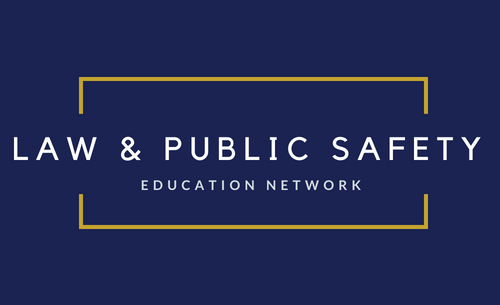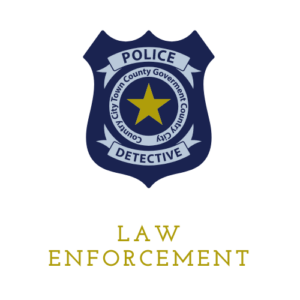Law Enforcement Course
Law Enforcement Course
This is a second level course designed for high schools. The course surveys law enforcement giving students a great basic understanding of the career. Please review the note in the course description advising schools to ensure students enrolled in the course have the opportunity to have a career in this area. The recommended prerequisite for this course is Introduction to Law and Public Safety.
To learn more about LAPSEN Courses and Standards – Click Here
Be sure to review the entire course standards first – Click Here
Industry Recognized Credential for this course – Click Here
Other Sources for Lesson Plans
California Educators Together– The great state of California has an insane amount of resources and lessons. Be sure to search with different key words. You do have to have an account – but they give them to all teachers: Click Here
Texas CTE Lesson Plans – They have some materials for Law & Public Safety: Click Here
Lesson Plan and Resource Links
Click on any of the sections below to see the standards for that section. Each has links to pages that will list lessons and resources that match that standard or standard’s element.
Most teachers do not teach in order of the standards as they are listed. Most organize the standards in an order that makes sense to them and addresses their local teaching environment. As a result, you may find standards split into multiple units. Ethics is a a good example – as many teachers teach ethics across several units and not on its own.
Not all standards are weighted equally. The course has suggested time to be dedicated to any one section. However, teachers have the discretion to adjust as needed. The main accountability is the course or pathway test. As long as students are learning the material and retaining it, most teachers have flexibility to implement the standards as they see fit.
Click on the Section below to have it open to show the standards and the link to the resources.
Resources are being added.
Please – submit YOUR lessons and resources. Email info@lapsen.org to learn how.
DO NOT SHARE ANY OF THIS CONTENT WITH STUDENTS!
Make a copy for your own use.
Once you have your own copy, you can modify assignments that can be shared with students.
This is not student curriculum – these are instructor unit lesson plans.
Section 1: Law Enforcement History, Crime Awareness & Causes of Crime
LAPSEN LE Course Lesson Plan Project lesson for Standards 1 & 2 by Josh Clark – Click Here
Standard 1: Students will describe a brief history of law enforcement.
Standard 2: Student will explain Peace officer authority in the United States
LAPSEN LE Course Lesson Plan Project lesson for Standard 3 by Josh Clark – Click Here
Standard 3: Student will describe the Bill of Rights and the rights for citizens and police
LAPSEN LE Course Lesson Plan Project lesson for Standards 4 & 5 by Josh Clark – Click Here
Standard 4: Student will compare crime statistics and reports
Standard 5: Students will differentiate between causes of crime
Section 2: Law, Criminal Justice & Trial Proceedings
LAPSEN LE Course Lesson Plan Project lesson by Josh Clark – Click Here
Standard 1: Student will understand the general provisions of the legal system
LAPSEN LE Course Lesson Plan Project lesson on CJS by Josh Clark – Click Here
LAPSEN LE Course Lesson Plan Project lesson on Trial Process by Josh Clark – Click Here
Standard 2: Describe the criminal justice system
Section 3: Corrections & Juvenile
LAPSEN LE Course Lesson Plan Project lesson by Josh Clark & Wendell Sessoms – Click Here
Standard 1: Students will understand the Adult Corrections System
Standard 2: Students will understand the Juvenile System
Section 4: Arrest
LAPSEN LE Course Lesson Plan Project lesson for Standard 1 by Josh Clark – Click Here
Standard 1: Students will recognize laws of arrest and describe how to apply those laws.
LAPSEN LE Course Lesson Plan Project lesson for Standard 2 by Josh Clark – Click Here
Standard 2: Students will recognize the laws pertaining to search and seizure and how to apply those laws.
Section 3: Students will recognize and discuss agency policies and procedures related to arrest.
Section 5: Ethics
LAPSEN LE Course Lesson Plan Project lesson by Josh Clark – Click Here
Standard 1: Students will understand Police policies and ethics
Standard 2: Students will define Personal integrity and ethical behavior
Standard 3: Students will explain disciplinary actions and processes.
Section 6: Traffic
LAPSEN LE Course Lesson Plan Project lesson by Josh Clark & Wendall Sessoms – Click Here
Standard 1: Students will discuss the reasons for enforcing traffic laws, as well as the procedures enforcing traffic laws.
Standard 2: Students will discuss the procedures for responding to a traffic collision scene and demonstrate how to properly complete a traffic collision investigation.
Standard 3: Students will explain the need for enforcing DWI laws, how to complete a DWI investigation and demonstrate proper SFSTs.
Section 7: Crime Scene Investigation
LAPSEN ILPS Lesson Plan Project lesson by Josh Clark & Wendall Sessoms – Click Here
Standard 1: Student will demonstrate basic crime scene processing skills
Standard 2: Student will describe proper evidence handling
Standard 3: Student will describe specialized evidence procedures
Section 8: Patrol Tactics & Investigative Work
LAPSEN LE Course Lesson Plan Project lesson for Standards 1 & 2 by Josh Clark – Click Here
Standard 1: Students will identify basic patrol skills, demonstrate proper report writing, and discuss the duties of a patrol officer.
Standard 2: Students will be able to identify and discuss the theories related to police patrols and most common patrol deployment methods.
LAPSEN LE Course Lesson Plan Project lesson for Standards 3, 4 & 5 by Josh Clark – Click Here
Standard 3: Students will identify how calls for service are prioritized, what patrol officers do in a typical patrol day, and how to identify various types of criminal activity.
Standard 4: Students will discuss the processes and methods for conducting basic, patrol-level investigations.
Standard 5: Students will identify and discuss the roles and responsibilities of the police patrol supervisor.
Section 9: Career Planning
LAPSEN LE Course Lesson Plan Project lesson by Josh Clark – Click Here
Standard 1: Student will describe personal qualifications, interests, aptitudes, knowledge, and skills necessary to succeed in Criminal Justice careers.
Standard 2: Student will identify the array of opportunities within the career of law enforcement
Standard 3: Students will explain the role and function of professional organizations, industry associations, and organized labor in a productive society.
Standard 4: Students will identify past, present, and future trends that affect careers in Criminal Justice.
Standard 5: Student will describe how working in law enforcement affects people

